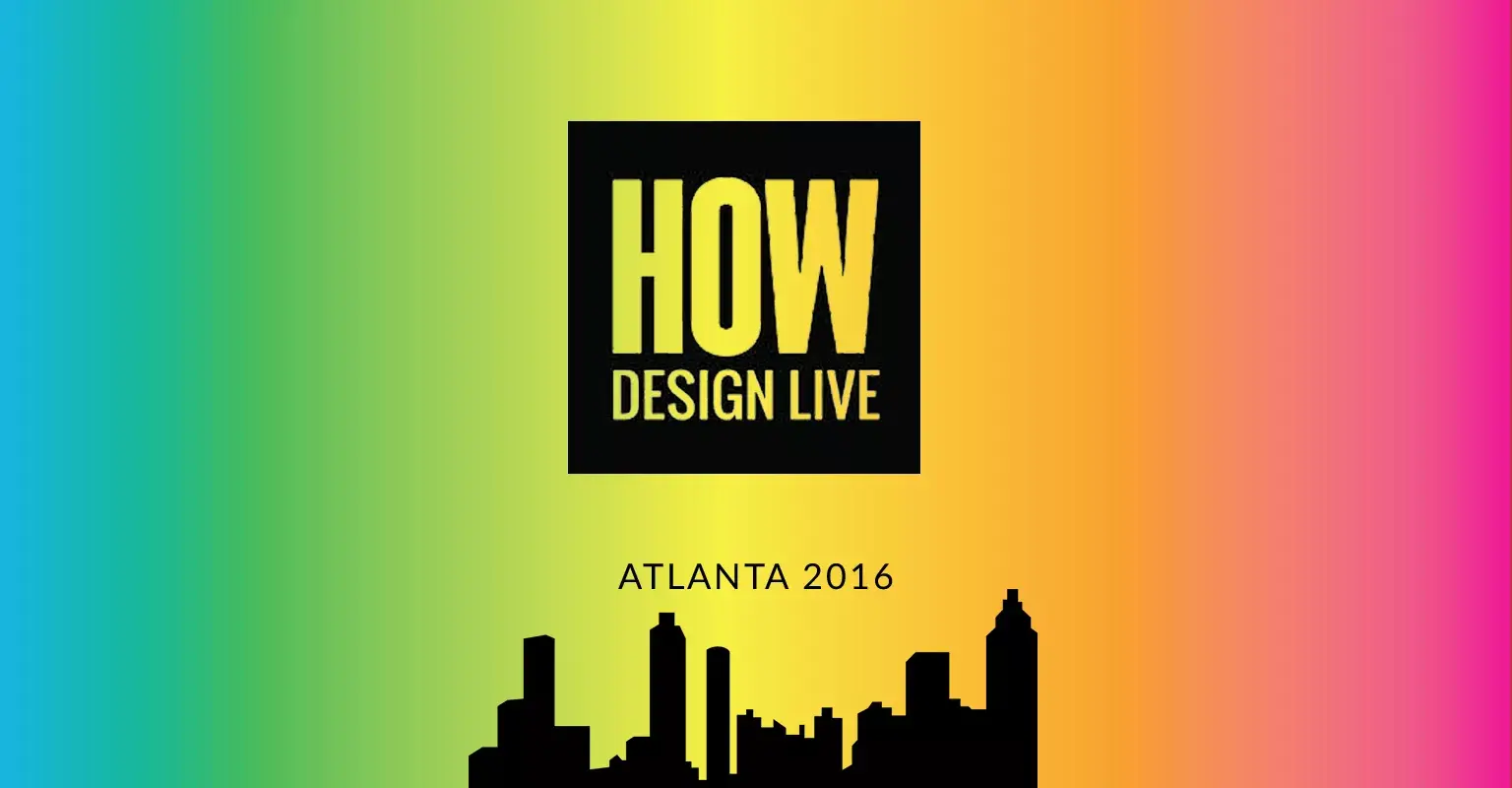
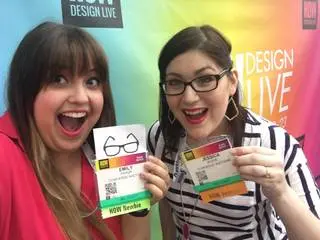
Each year, Concierge sends our designers to a conference in order to encourage continued education, to help build our skills, open our minds to new ideas, and come back with some fresh insights. This year, I attended HOW Design Live in Atlanta, GA with our Brand Designer. It was a five day event full of breakout sessions, keynotes, workshops, and design competition. Their goal is to refuel our creative inspiration, give access to iconic graphic designers around the world, and change our perspective on how to see the world. It was five long days full of valuable information, thought-provoking keynotes, and lots and lots of coffee. Here are five of my favorite takeaways from the conference.
Top 5 Things I Learned at HOW Design Live 2016.
1. “You should build your personal brand while on the job.” – Terri Trespicio
I stepped into this session having no idea what a personal brand even was, much less what mine would be. I thought, how can I have a personal brand while working in-house for a company? Within the first 10 minutes, Terri answered that question. “If Coca-Cola, what is essentially brown sugar water can have a brand, so can you, a complex human being.” I love her. She’s sassy, funny, and knows her stuff.
What I learned:Your personal brand should encompass three things: promise, presence, and practice.
What do people specifically come to you for? What do your co-workers rely on you for that only you can bring to the table? This is your promise.
How do people feel after interacting with you? What is missing from a room when you’re not there? This is your presence.
What do you wish people came to you for? What is your long-term goal? This is your practice.
These three things are what develop your personal brand, and they are what make you invaluable to your employer. If they can see what your promise and presence are, which are essentially your top skills and knowledge, it makes you more valuable. They fully recognize what they rely on you specifically to do. If they know what your practice is, then they know your career goals and are more likely to suggest you for the next promotion. Branding yourself doesn’t solely better yourself – it betters the company you work for.
And, always think like an entrepreneur because you’re the entrepreneur of your own career. Only you can set your personal brand, and it has to be a good one. Work for a company where the employee-employer relationship is mutually beneficial, and don’t work in your career as a “freelancer.” This is not a jab to those who do freelance work, but successful freelance designers are entrepreneurs, not simply “freelancers.” They don’t wait to be given work; they don’t complain about their wages; and they don’t do bottom level work that no one else wants – and neither should you. Build your brand to be your best self.
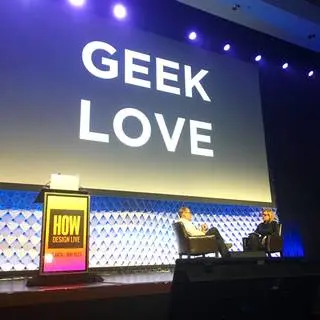
2. Your bias is bull$#!t. – Joel Beukelman When the title of a session includes a curse word, it draws a lot of designers in. I can’t explain why, but I’m guessing they see the speaker as more personable or relatable, and Joel is definitely both. In his own words, “Always talk to the person next to you at the bar.” Everyone knows someone, so introduce yourself to everyone you meet and tell them what you do. If I hadn’t talked to Joel one-on-one after his talk, I would never have known he’s good friends with one of my good friends, and Joel and I wouldn’t be Snapchat friends now. It’s a small world, and networking is everything.
What I learned: Your bias is bull$#!t… unless it comes from experience. As a designer, it’s my job to understand people. It’s also my job to know that not everyone is like me and will not have the same preferences I do. I can’t – and shouldn’t – force my team to agree with my designs based on my own version of what makes good design. Never justify your decisions by starting with, “In my opinion…” When it comes to effective marketing, your opinion doesn’t matter unless it’s backed with experience. Your personal bias serves no one. If I can’t back my design decisions with experience from research, proven statistics, successful trends, or impressive metrics, then I shouldn’t oppose suggestions.
I’m lucky to work under people who trust my creative eye, but I never hesitate to take their suggestions because there is no proof that my creative bias tops their experience-based bias. However, I do know that their experience within the field is greater than mine, and that’s what matters most.
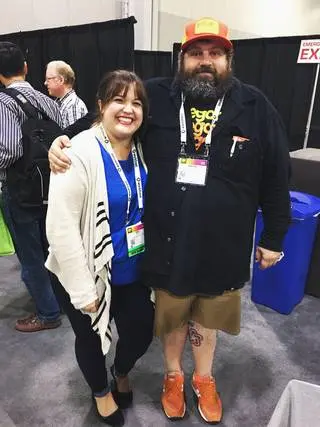
3. Take one day a week for you and your family to be completely unplugged. – Tiffany Shlain How do we adapt creativity in the 21st century? We’re surrounded by helpful technology and it’s always changing, but can too much technology be a negative thing? A while ago, I took a year-long break from social media. Having so many distractions was doing just that – distracting me from my life and ability to be in the moment, which in turn was affecting my creativity. My ability to think in new ways. My patience. My stress level. My happiness. I was too stimulated. While I’m back on social media now, my year-long hiatus taught me a lot, and trained me to be better at not relying on technology so much. I can only imagine how “present” I would be if I completely cut out the screens for one day a week.What I learned: There is so much good in technology, but it also takes a lot away. Researchers have found that too much technological stimulation has the same addictive effects of drugs and alcohol, and just like alcohol, too much of a good thing is a bad thing. Taking one day off a week (or even half a day!) completely away from all technology re-engages us and reboots our creativity. Our brains are meant to step into a phase called “Default Mode Network.” You’re in DMN mode when you’re daydreaming or experiencing a wakeful rest. But, with the constant distraction of technology, your brain never enters this mode because there is always something to focus on. So unplug yourself and spend time with your significant other, enjoy an outdoor activity, mindlessly paint something, or just sit and daydream. It’s not only relaxing, but it makes you better at your job. Science proves it.
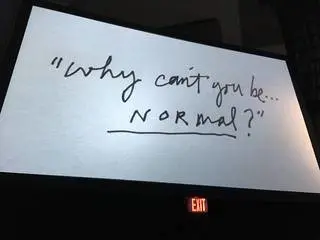
4. The things that made you weird as a kid make you great today. – James Victore I’ve been a fan of James’ work for a while, and not just because he’s a local Austinite. He’s a bit outrageous, pushes your comfort zone, and takes chances, which has led to his overwhelming success. He’s also super weird, which apparently works in the creative field.
What I learned: Your quirks are what will take you to the top. Too often creative children are called “weird” or are casually asked “why can’t you be normal?” We don’t think too much about what these words are really communicating to them. As a result, many kids suppress their creativity to avoid being picked on, and they hide away the things that make them different. Why do people treat creativity this way? Because creativity is dangerous. Its job is to disrupt the norm. It creates change. All of the things that made you weird as a kid are what make you great today. They’re what helps you see new solutions to old problems. Your gifts make your work.
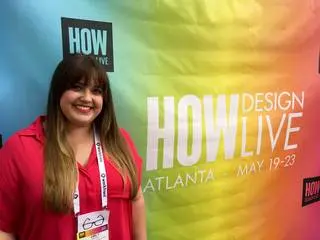
5. Don’t separate work and life. Balance them. – Pum Lefebure
I listened to a lot of great designers at the conference. I got to meet some of them, and I wondered how they got to be highly successful while living such exciting personal lives. I figured they had found a job where they were able to have work/life balance and completely separate the two. I was wrong. They had completely integrated work and life, and that balanced them as a person.
Talk to your co-worker about the house you’re planning to buy, watch a funny video clip together while brewing that 9AM pot of coffee for the office, talk about your weekend plans, and just overall be yourself. Your co-workers are allowed to know the real you, from your sense of humor to your pet peeves. You spend over 9 hours a day with them. There is no such thing as work friends… they’re just your friends. If you love what you do, love the people you work with, and love the life you live at home, those things will naturally integrate over time to help bring you balance. You are the designer of your own life.